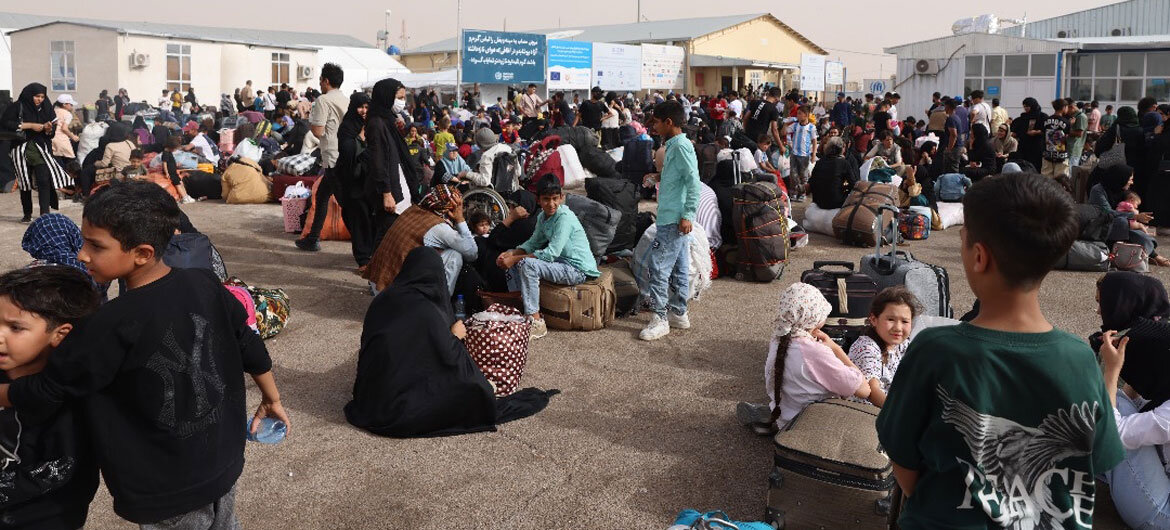Some 4,300 Afghan refugees deported from Iran per day: UNHCR

TEHRAN - Between September 11 and 17, an average daily return of 4,300 Afghan refugees from Iran was registered, UNHCR reported in a press release on Friday.
Daily returns rose sharply after June 13, with additional spikes recorded after June 25. Since then, the trend has declined, the report added.
The average daily return between September 11 and 17 was 4,300, which is substantially lower than the previous week’s 7,400. Nevertheless, the current level remains well above the first quarter of 2025, when the daily average was approximately 3,500.
As of September 17, over 1.79 million Afghans returned from Iran since March 20, 2025, and over 2 million since the beginning of the year, bringing the total returns from both Iran and Pakistan in 2025 to over 2.7 million.
Returns by documentation status
From September 11 to 17, headcounted slip holders made up 33% of total returnees, with 35% of total deportees being headcounted slip holders. Looking at the broader period since March 20, approximately 44% of total returnees and 44% of total deportees are headcount slip holders.
Deportations
In 2025, 1.24 million returns — or 60% of the total — were deportations. Of these, over 816,000 Afghans were deported after June 13. July 2025 recorded the highest monthly deportation figures in the past three years, with a total of 460,000 individuals deported.
During the reporting period from September 11 to 17, over 30,400 individuals were deported, 75% of whom crossed through the Islam Qala border point and 25% through the Zaranj border point. The proportion of deportees out of the total returns in the reporting week was 62%.
Solution Strategy for Afghan Refugees
A meeting of the local core group of Solution Strategy for Afghan Refugees (SSAR) was held in Tehran on September 3.
The head of the National Organization for Migration, Nader Yar-Ahmadi, in cooperation with the Director-General for International Environmental and Sustainable Development Affairs of the Ministry of Foreign Affairs, Mohammad Hassani Nejad Pirkouhi, co-chaired the meeting, ISNA reported.
Dutch Chargé d’affaires to Iran, as the head of SSAR group; Stefan Priesner, UN Resident Coordinator in Iran; and representatives from different international institutions including the United Nations Children’s Fund (UNICEF), United Nations High Commissioners for Refugees (UNHCR), International Organization for Migration, United Nations Development Program (UNDP), the World Health Organization (WHO), as well as representatives from the embassies of Germany, Italy, Netherlands, Turkey, Switzerland, Denmark, and South Korea participated in the meeting as the members of SSAR.
Addressing the meeting, Yar-Ahmadi said Iran has hosted Afghan refugees for almost five decades, including the massive wave of Afghan migration into the country in recent years. However, the contribution of the international community, Western countries, and SSAR member states has been inadequate and ineffective.
For his part, Hassani Nejad Pirkouhi highlighted the country’s unparalleled humanitarian measures, particularly in hosting refugees, saying that the international community, including European countries, has failed to fulfill their international commitments and responsibilities under international refugee law. They have negatively affected the conditions by adopting political and selective approaches, as well as imposing unilateral sanctions and coercive measures against the government and people of Iran.
The representative of international organizations, like the UN resident representative, elaborated on outstanding actions taken by the country in dealing with the large number of refugees who are residing in Iran.
During the meeting, the UNHCR representative proposed holding trilateral talks with Iran and Afghanistan. The Iranian officials voiced the country’s readiness to hold quadrilateral talks with the presence of Pakistan, stressing that the trilateral talks would require greater coordination.
The Solutions Strategy for Afghan Refugees (SSAR) was drafted in 2012 by Afghanistan, Iran, and Pakistan, with the support of UNHCR. The strategy advances a regional approach to solutions and promotes burden and responsibility-sharing for refugees at the regional and global levels.
Leave a Comment